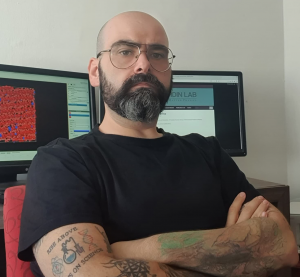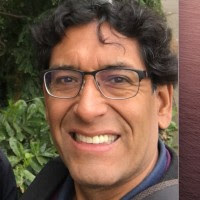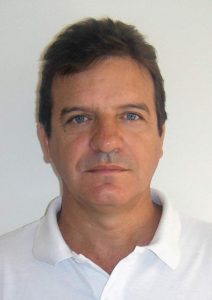-
Defesa de mestrado de Maria Vitória Cavalheiro Issler – 7 de maio de 2021 – 9 horas
O Programa de Pós-graduação em Física convida a todos para:
Defesa de Dissertação*
Maria Vitória Cavalheiro Issler
MODELO DA INFLUÊNCIA DE MIRNAS NO CROSS-TALK DE AUTOFAGIA E APOPTOSE EM CÂNCER DE MAMA TRIPLO NEGATIVO
*(evento de reposição da disciplina seminários)
Banca Examinadora
Prof. Dr. André Avelino Pasa – (presidente) – UFSC/FSC
Prof. Dr. Ney Lemke – (membro externo) – UNESP
Profª. Drª. Evelyn Winter da Silva – (membro titular) – UFSC/Curitibanos
Drª. Júlia Cisilotto – (membro titular) – UFSC/PPGFARData: 7 de maio de 2021 – sexta-feira – Horário: 9 horas
Link de acesso a sala virtual: https://conferenciaweb.rnp.br/webconf/ppgfsc-ufsc
-
Seminário com José Rafael Bordin – 30 de abril de 2021 (sexta-feira) – 10h15min
O PROGRAMA DE PÓS-GRADUAÇÃO EM FÍSICA convida para o seminário:
Self-assembly in 2D competitive colloids*

José Rafael Bordin
Universidade Federal de Pelotas / Instituto de Física e Matemática
*Evento de presença obrigatória da disciplina seminários
Resumo:
The study of chemical building blocks as amphiphilic molecules, block copolymers, colloids and nanoparticles have attracted the attention in soft matter physics in recent years due their properties of self-assembly. The variety of the length scales and geometry of the patterns arise from the different types of potential energies involved and from the shapes of the colloidal particles. Particullarly, spherical colloids with tunable competitive interactions can be used to generate distinct aggregated patterns. The combination of a short attractive interaction and a long range repulsion can describe the nucleation in these systems with competitive interactions. In this talk, I’ll discuss our recent findings in the behavior of these colloids in 2D and quasi-2D systems, as the relations between aggregation and diffusion.
Data: 30 de abril de 2021 – (sexta-feira) – Horário: 10h15min
Link de acesso ao canal do programa no YouTube: https://youtu.be/dmD0oFypwj8
-
Defesa de tese de Jerdson Americo Silva Serejo – 23 de abril de 2021 – sexta-feira – Horário: 14 horas
O Programa de Pós-graduação em Física convida a todos para:
Defesa de Tese*
Jerdson Americo Silva Serejo
ESTUDO COMPUTACIONAL E ANALÍTICO DA ANTI-PEROVSKITA Li3OCl PARA APLICAÇÃO COMO ELETRÓLITO SÓLIDO EM BATERIAS DE ÍONS DE LÍTIO
*(evento de reposição da disciplina seminários)
Banca Examinadora:
Prof. Dr. Luis Guilherme de Carvalho Rego – (presidente) – UFSC
Prof. Dr. Carlos William de Araujo Paschoal – (membro externo) – UFC/FSC
Prof. Dr. Carlos Eduardo Maduro de Campos – (membro titular) – UFSC/FSC
Prof. Dr. Lucas Nicolao – (membro titular) – UFSC/FSC
Dr. Rodolpho Mouta Monte Prado – (membro titular) – UFMA/PGFísicaData: 23 de abril de 2021 – sexta-feira – Horário: 14 horas
Link de acesso a sala virtual: https://conferenciaweb.rnp.br/webconf/ppgfsc-ufsc
-
Seminário com Ariel Werle – 23 de abril de 2021 (sexta-feira) – 10h15min
O PROGRAMA DE PÓS-GRADUAÇÃO EM FÍSICA convida para o seminário:
 Sobre águas vivas e o cessamento da formação estelar em galáxias*
Sobre águas vivas e o cessamento da formação estelar em galáxias*Ariel Werle
INAF – Osservatorio Astronomico di Padova
*Evento de presença obrigatória da disciplina seminários
Resumo:
Aglomerados de galáxias podem desencadear uma série de processos físicos capazes de arrancar o gás de galáxias que neles ingressam, levando à transformação morfológica de galáxias espirais em lenticulares ou elípticas. Neste seminário, apresentarei resultados preliminares de dois projetos relacionados ao efeito da interação com o aglomerado no cessamento da formação estelar em galáxias. Em um primeiro momento, falaremos sobre galáxias água viva, objetos que estão tendo seu gás arrancado devido à pressão exercida pelo gás quente do aglomerado. O gás arrancado forma estruturas semelhantes a tentáculos, inspirando o nome “jellyfish galaxies/galáxias água viva”. Estes tentáculos abrigam regiões de alta formação estelar. Nossos resultados mostram que estas regiões sustentam altas e quase constantes taxas de formação estelar por ~100 milhões de anos, as massas e tamanhos físicos dessas regiões são compatíveis com os progenitores de aglomerados globulares. Apresentarei também resultados da análise de 21 galáxias post-starburst no centro de aglomerados em redshift z~0.3. Estes são objetos que tiveram a sua formação estelar encerrada recentemente, após um período de alta taxa de formação estelar. Nossas observações espacialmente resolvidas demonstram que o cessamento da formação estelar pode acontecer tanto de fora para dentro quanto de dentro para fora, indicando uma variedade de processos físicos em ação. Uma das galáxias post-starburst em nossa amostra teve sua formação estelar encerrada muito recentemente, entre 20 e 100 milhões de anos atrás, e ainda apresenta uma cauda de gás ionizado compatível com a hipótese de que esse objeto foi uma galáxia água viva em um passado próximo.
Data: 23 de abril de 2021 – (sexta-feira) – Horário: 10h15min
Link de acesso ao canal do programa no YouTube: https://youtu.be/dFPhdw2J2UM
-
Defesa de mestrado de Muryel Guolo Pereira – 19 de abril de 2021 – 13 horas
O Programa de Pós-graduação em Física convida a todos para:
Defesa de Dissertação*
Muryel Guolo Pereira
The Circumnuclear Region and Long-Term Variability of the Active Nucleus in NGC 2992
*(evento de reposição da disciplina seminários)
Banca Examinadora
Prof. Dr. Daniel Ruschel Dutra – (presidente) – UFSC/FSC
Prof. Dr. Rogério Riffel – (membro externo) – UFRGS/IF
Profª. Drª. Natalia Vale Asari – (membro titular) – UFSC/FSC
Prof. Dr. Tiago Vecchi Ricci – (membro externo) – UFFS/Cerro LargoData: 19 de abril de 2021 – segunda-feira – Horário: 13 horas
Link de acesso a sala virtual: https://conferenciaweb.rnp.br/webconf/ppgfsc-ufsc
-
Seminário com Prof. Enrique Solano – 16 de abril de 2021 (sexta-feira) – 10h15min
O PROGRAMA DE PÓS-GRADUAÇÃO EM FÍSICA convida para o seminário:
Computação Quântica: da Ciência à Tecnologia*

Prof. Enrique Solano University of the Basque Country, Bilbao, Spain
*Evento de presença obrigatória da disciplina seminários
Resumo:
Haverá uma introdução pedagógica à computação quântica do ponto de vista histórico, científico e tecnológico. Em seguida, será apresentada a transição da computação quântica da ciência fundamental para a possibilidade de revolucionar a tecnologia com aplicativos impossíveis para a computação atual. Por fim, comentar-se-á sobre as possibilidades de desenvolvimento da carreira de pesquisador na área de negócios, tanto na área de software e hardware, clássica e quântica.
Biografia
Enrique Solano obteve o título de Mestre em Física pela Pontifícia Universidade Católica do Peru, em Lima, Peru, e o Doutorado em Física pela Universidade Federal do Rio de Janeiro, Brasil. Ele trabalhou como pesquisador no Max-Planck Institute for Quantum Optics, Garching, e na University Ludwig-Maximilian em Munique, Alemanha. É Professor Ikerbasque e diretor do centro internacional “Quantum Computing and Quantum Technologies (QUTIS)” da University of the Basque Country, Bilbao, Espanha, bem como Professor Ilustre e diretor do centro internacional “Quantum Artificial Intelligence for Science e Technology (QuArtist)” na Shanghai University, China. Em 2020 ele ocupou o cargo de Gerente Geral da empresa IQM Germany em Munique, Alemanha, pioneira e líder europeia em computação quântica. O Prof. Solano é um especialista em computação quântica e tecnologias quânticas, nas quais tem feito contribuições científicas e tecnológicas de impacto internacional. Ele publicou mais de 250 artigos científicos e seus centros de pesquisa são considerados think-tanks influentes de alta originalidade e produtividade. Este ano 2021 o Prof. Solano planeja criar empresas de consultoria e desenho disruptivo de computadores quânticos na Alemanha, para Europa e o mercado mundial.Data: 16 de abril de 2021 – Horário: 10h15min
Link de acesso ao canal do programa no YouTube: https://youtu.be/w4Af1kt4IPA
-
Período de matrícula em disciplina – semestre 2021/1
Prezado discente.
No período de 5 a 16 de abril de 2021 você deve efetuar o pedido de matrícula nas disciplinas que deseja cursar no semestre 2021/1. Todos os alunos regularmente matriculados devem executar este procedimento.
Segue abaixo um tutorial com o procedimento de matrícula no PPGFSC. Leia com a atenção:
Tutorial procedimento de matrícula PPGFSC
Informações para o procedimento de matrícula em disciplina isolada podem ser acessadas no link: https://ppgfsc.posgrad.ufsc.br/duvidasfrequentes/
-
Pesquisador visitante do PPGFSC/UFSC participa de grupo de pesquisa que encontrou evidências da evasiva partícula de Odderon

Professor visitante do Programa de Pós-graduação e Física da UFSC e pesquisador de física de partículas da Universidade de Lund
O professor Roman Pasechnik, professor visitante do Programa de Pós-graduação e Física da UFSC e pesquisador de física de partículas da Universidade de Lund, integra o grupo de pesquisa sueco-húngaro que descobriu a partícula mítica Odderon com a ajuda de uma extensa análise de dados experimentais do Grande Colisor de Hádrons do CERN na Suíça. Por 50 anos, a comunidade de pesquisa tem buscado sem sucesso por essa partícula.
Mais detalhes sobre a descoberta podem ser acessadas no physics.org
fonte: physics.org
-
Seminário com Prof. Dr. Neri Alves – 26 de março de 2021 (sexta-feira) – 10h15min
O PROGRAMA DE PÓS-GRADUAÇÃO EM FÍSICA convida para o seminário:

Diodos e transistores com gate eletrólitico (EGT) como potenciais dispositivos para eletrônica impressa e ferramentas para o estudo de semicondutores e interfaces.*
Prof. Dr. Neri Alves
Departamento de Física, UNESP (Pres. Prudente)
*Evento de presença obrigatória da disciplina semináriosResumo:
A eletrônica impressa é uma área de grande interesse tecnológico e científico, especialmente em determinados nichos como, por exemplo, embalagens inteligentes, cartões de identificação por emissão eletromagnéticas (RFIDs), internet das coisas (IoT) e sensores. Nesta apresentação aborda-se o estudo da versão impressa de dois dos dispositivos fundamentais para o desenvolvimento da eletrônica impressa: o diodo e o transistor. Ressalta-se que o desenvolvimento de aplicações de eletrônicas impressa dependem fundamentalmente da capacidade de produzir bons diodos e transistores, os quais são utilizados em quase todos circuitos. Para a produção de um transistor impresso o principal desafio consiste em reduzir a tensão de operação, melhorar a estabilidade e aumentar a corrente de saída. Em eletrônica impressa essas características podem ser obtidas mais facilmente com os chamados transistores de eletrólito no gate (EGTs) que fazem uso de eletrólitos em substituição ao material dielétrico dos transistores convencionais. Os EGTs estão em destaques pela sua simplicidade de fabricação e versatilidade em aplicações, especialmente como sensores biológicos e em circuitos neuromórficos. Nesta apresentação, para além do desenvolvimento dos dispositivos propriamente dito visando suas aplicações, explora-se o fato de que os diodos e os EGTS constituem poderosas ferramentas para o estudo das propriedades dos materiais semicondutores e de suas interfaces com os eletrodos e eletrólitos. O conteúdo acima é apresentado ilustrando os trabalhos atualmente em desenvolvimento pela equipe do Laboratório de Dispositivos e Sensores Orgânicos (LaDSOr), coordenado pelo Prof. Dr. Neri Alves e situado no Departamento de Física da Faculdade de Ciências e Tecnologia, UNESP, Pres. Prudente.
Data: 26 de março de 2021 – (sexta-feira) – Horário: 10h15min
Link de acesso ao canal do programa no YouTube: https://youtu.be/OY6L3EoF_q8
-
Doutoranda da UFSC é destaque no portal UOL pelo seu trabalho de divulgação científica nas redes sociais
A doutoranda Carleane Patrícia da Silva Reis (PPGFSC/UFSC) foi recentemente entrevistada pela revista Trip TPM (UOL), face ao seu trabalho nas redes sociais denominado “física.preta”. O objetivo é divulgar as contribuições de minorias sociais para o progresso da ciência e ressaltar a importância do papel das Universidades para a sociedade brasileira.A entrevista na íntegra pode ser visualizada no site:Nas redes sociais procure por @física.preta
Facebook Auto Publish Powered By : XYZScripts.com





